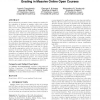Free Online Productivity Tools
i2Speak
i2Symbol
i2OCR
iTex2Img
iWeb2Print
iWeb2Shot
i2Type
iPdf2Split
iPdf2Merge
i2Bopomofo
i2Arabic
i2Style
i2Image
i2PDF
iLatex2Rtf
Sci2ools
ATAL
2015
Springer
2015
Springer
Aggregating Partial Rankings with Applications to Peer Grading in Massive Online Open Courses
We investigate the potential of using ordinal peer grading for the evaluation of students in massive online open courses (MOOCs). According to such grading schemes, each student receives a few assignments (by other students) which she has to rank. Then, a global ranking (possibly translated into numerical scores) is produced by combining the individual ones. This is a novel application area for social choice concepts and methods where the important problem to be solved is as follows: how should the assignments be distributed so that the collected individual rankings can be easily merged into a global one that is as close as possible to the ranking that represents the relative performance of the students in the assignment? Our main theoretical result suggests that using very simple ways to distribute the assignments so that each student has to rank only k of them, a Borda-like aggregation method can recover a 1 − O(1/k) fraction of the true ranking when each student correctly ranks t...
| Added | 16 Apr 2016 |
| Updated | 16 Apr 2016 |
| Type | Journal |
| Year | 2015 |
| Where | ATAL |
| Authors | Ioannis Caragiannis, George A. Krimpas, Alexandros A. Voudouris |
Comments (0)

